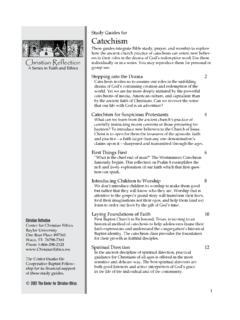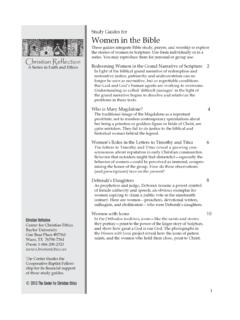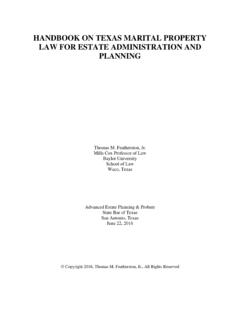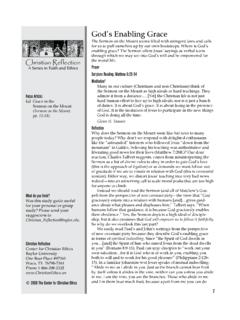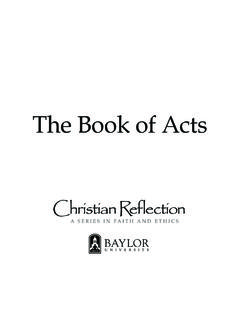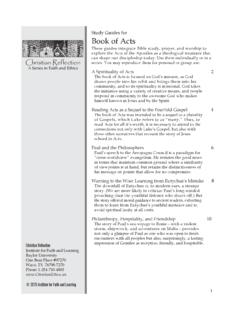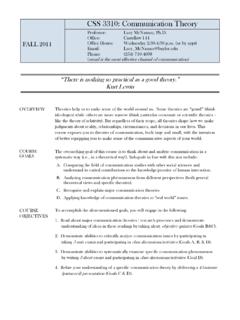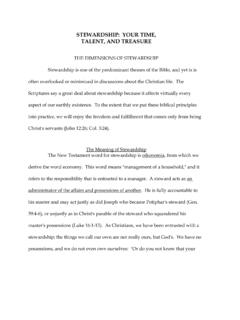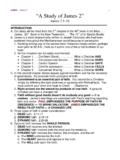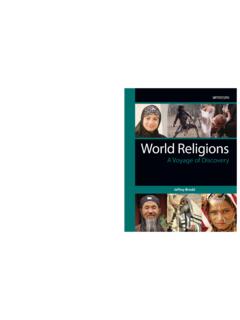Transcription of The History of Gambling - Baylor University
1 88 Copyright 2011 Center for christian Ethics at Baylor University The History of GamblingBy HeatHer VacekWhy have humans throughout History gambled? What explains the recent explosion of Gambling in american culture? approaching these questions from legal, economic, political, psychological, social, and ethical perspectives, the four books reviewed here provide insight about the complex History of is America s favorite pastime, at least when our activities are measured by revenue. The $57 billion spent by gamblers in 2006 far exceeds the $20 billion paid for movie tickets and music record-ings and the $28 billion in sales from McDonalds, Burger King, Wendy s, and Starbucks combined. Americans gamble freely. In fact, only twenty-eight percent of them think Gambling is morally the early twentieth century the conservative evangelist Billy Sunday (1862-1935) preached against the evils of Gambling and liberal Social Gospel founder Walter Rauschenbusch (1861-1918) called it the vice of the savage.
2 Yet, as the authors of one of the volumes reviewed here note, modern theologians do not debate the morality of Gambling the way they do the morality of abortion or euthanasia. 1 Evangelicals and born-again Christians today are less likely to find Gambling morally acceptable (twenty-seven percent and forty-five percent respectively), but Gambling has failed to rally christian concern in the same ways as other contemporary social Statistics about the prevalence of Gambling among the American popula-tion make it clear that many Christians gamble. When Christians buy lottery tickets, bet on a sporting event, or play in a charity game of bingo, are they conscious of possible conflicts with their beliefs? Do notions of greed, the stewardship of resources, and the protection of vulnerable populations rise to consciousness for Christians visiting casinos?
3 Do they find some forms of Gambling acceptable and others sinful? If so, how do they justify differences? The History of Gambling 89 Gambling in various forms has been around throughout recorded History , but in-depth scholarship on it is a recent phenomenon occasioned by the resurgence of widespread Gambling in America in the 1980s and 90s. The four books reviewed here approach the topic from different scholarly angles: the legal History of Gambling in America, History of the practice and the business of Gambling , focused assessment of the risks and benefits of gam-bling, and the moral evaluation of Gambling . Some of the authors remain more optimistic about the practice s contribution to society, while others focus on potential harmful consequences of the human desire to gamble. Together they provide insight about the complex History of Gambling and speculation about why humans play games of details of the debate about the costs and benefits of Gambling are complicated, but Christians need not remain immobilized in what has become a complex tug of war between supporters and opponents.
4 Concerned Chris-tians, informed by the research reported in books like those reviewed here, can find faithful and productive ways to respond to the growth of the gam-bling industry and the lives it affects. Congregations might decide to attend to the misery created for families by those addicted to Gambling . Looking to the political realm, Christians might discover questions to ask of existing and proposed legislation. Reflection might also prompt Christians to con-sider curtailing their own gaming. YIn Jokers Wild: Legalized Gambling in the Twenty-first Century (Westport, CT: Praeger, 2000, 232 pp., $ ) editors Thomas Barker and Marjie Britz offer a History of Gambling in the United States through a regulatory lens and assert that legal Gambling is, at best, problematic behavior with good and bad consequences (p. 3). Barker, a professor of Criminal Justice and Police Studies at Eastern Kentucky University , and Britz, then associate professor of Criminal Justice at The Citadel (now at Clemson University ), are interest-ed in the shape and development of laws that regulate Gambling .
5 Acknowl-edging differences in public opinion about Gambling through the years, they report why Gambling has made business sense to many, but they also attend to the consequences of Gambling on individuals, groups, and communities. From their legal vantage point, Barker and Britz understand Gambling as a deviant behavior that has prompted legislation. They distinguish two categories of deviant behavior: Mala in se acts such as murder, rape, and robbery that are generally recognized as inherently evil, from Mala Prohibita behaviors that transgress the moral codes of certain groups but not others (in American History these have included abortion, homosexuality, pornog-raphy, drug use, Gambling , and tobacco use). The former category of behav-iors has proven easier to legislate because of widespread agreement; laws regarding the latter are likely to generate conflict because moral standards differ among Americans.
6 90 The Gambling Culture Public opinion concerning morality can quickly shift. For example, Barker and Britz note that during the twentieth century in the United States Gambling and the use of tobacco were social experiments in the process of how laws are made and changed in defining deviant behavior (p. 1). Smoking, once an accepted behavior is now banned in most public spaces, and the tobacco industry is a pariah. Alternately, Gambling , once presumed to be a sinful, crime-ridden activity confined to Nevada, is now legal, in some form, in all states but Utah and opening chapter looks at the footprint of Gambling on the eve of the twenty-first century. Three historical chapters trace the presence of gam-bling in America, from the public lotteries of the colonial era, to New York casinos run by crime syndicates in the early twentieth century, to the rise of Gambling as a legitimate industry in Nevada and Atlantic City in the 1940s and 50s.
7 Two chapters follow the more recent rise of Native American-owned casinos, riverboat Gambling , and state lotteries. Along the way, the authors discuss the legislation that made Gambling possible and the regulations that attempted to make it disappear. The final portion of Barker and Britz s text considers why people gam-ble, the trouble caused when Gambling becomes addictive, and treatments available for problem gamblers. In conclusion they predict, incorrectly it turns out, that the growth and expansion of Gambling experienced in the late twentieth century would slow. More than a decade old, the statistics in this text prove outdated. In addition, the volume only gestures toward a possible future of internet Gambling , now a significant, worldwide revenue generator. Regardless, the challenge they identify remains true: Americans must decide whether Gambling serves as recreation, a social problem, or both.
8 Barker and Britz offer a comprehensive yet accessible text that provides a good primer for those hoping to learn more about the conflicts, legal and otherwise, that surround the Gambling industry. YLess accessible because of its dense historical detail, but a valuable source of information nonetheless, is David G. Schwartz s Roll the Bones: The History of Gambling (New York: Gotham, 2006; 592 pp., $ ). Covering five thousand years of human Gambling practice, this volume is encyclopedic in breadth. Arguing that Gambling infuses all human cultures, Schwartz displays the variety of Gambling games and discusses the business of Gambling . This book offers a less-than-equal assessment of the social costs and benefits of Gambling , but Schwartz did not set out to write with such balance. Instead, his own fascination with the persistence and growth of Gambling around the world shines through as he takes the reader inside the world s casinos and sits alongside both high stakes gamblers and thousands more people who made more modest (but equally as hopeful) bets.
9 Schwartz The History of Gambling 91notes religious and superstitious connections to the practice of Gambling , but provides scant attention to opposition. Schwartz, the Director of the Center for Gaming Research at the Univer-sity of Nevada, Las Vegas, provides expert coverage of games, gamers, and the modern industries that take advantage of the profits made possible by the human propensity to gamble. His volume will be most valuable to those interested in the details of particular Gambling games, the ways they spread from continent to continent, and the intricacies of Gambling industry growth. YGambling: Who Wins? Who Loses? (Amherst, NY: Prometheus Books, 2003; 358 pp., $ ), edited by sociologist Gerda Reith, provides a more balanced approach in assessing the economic benefits and social costs of Gambling by including the work of experts from legal, economic, political, psychological, social, and ethical perspectives.
10 Of the four texts reviewed, this collection of essays provides insight on the widest range of topics. Where Schwartz s text paints a lively picture of the longstanding appeal of Gambling and its impressive growth, Reith s volume concludes that the overall economic impact of Gambling is not as unambiguously positive as it may first appear (p. 12). The book assesses research from the United States, Great Britain, Canada, and Australia, adeptly covering much of the same historical and legal ground found in the other three volumes. This text, however, spends more time highlighting debates about problem gam- bling. Three chapters explore the ways compulsive or pathological gam-bling resembles other addictions and how medical classifications of the problem differ by country. Contributors offer detailed yet easy-to-understand data on a variety of topics ranging from the percentage of adults in the United States who have ever gambled (86%), to the relative probability of winning in various games (roulette, craps, or slot machines), to public perceptions of the arrival of casinos in their towns.

